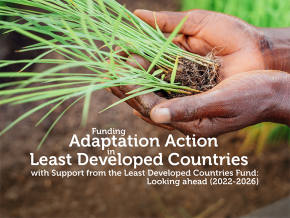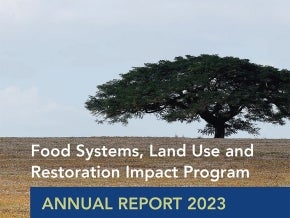
The Global Environment Facility’s member countries have endorsed an ambitious new strategy for its climate adaptation funds, providing increased support for Least Developed Countries (LDCs) and Small Island Developing States (SIDS) as they work to build a more resilient future and implement their national adaptation plans.
At the 32nd Council meeting of the Least Developed Countries Fund (LDCF) and Special Climate Change Fund (SCCF), representatives of vulnerable low-income and oceanic developing states welcomed plans for more targeted assistance from the funds, and two countries – Denmark and Finland – announced new financial pledges to the LDCF.
Madeleine Diouf, Chair of the Least Developed Countries Group, said the new programming strategy – which raises the funding cap to $20 million from $10 million for LDCs, and creates a special funding window for SIDS – reflects recipient countries’ priorities as they make plans for coping with a changing climate.
Those include efforts to fortify agriculture, food security and health; water security; early warning and climate information services; nature-based solutions to reduce exposure to climate impacts; and to meet urgent needs in areas such as climate-resilient infrastructure, ecosystem restoration, and disaster risk management.
“These funds are critical lifelines,” she said. “My own country, Senegal, and so many other countries that I know well, have greatly benefited from valuable LDCF support. I am also optimistic about a renewed SCCF which promises great potential to support highly vulnerable SIDS and catalyze technology transfer and private sector innovation for adaptation.”
Ali’ioaiga Feturi Elisaia of Samoa, speaking on behalf of the Pacific constituency, said the GEF-run climate adaptation funds were especially important to at-risk small island states which must otherwise compete with countries around the world to access multilateral resilience financing.
“Funding from the SCCF gives us a sense of certainty,” he said.
The LDCF and SCCF were established in 2001 to support developing countries’ climate change adaptation efforts, with funding for country-driven projects that address national priorities. Since then, they have provided more than $2 billion in grants for 448 climate change adaptation projects and programs.
The LDCF is the only fund entirely dedicated to supporting climate adaptation action in Least Developed Countries and its portfolio of projects have directly reduced the climate vulnerability of more than 51 million people. The fund also helps countries prepare national adaptation plans and action programs as required by the UN Framework Convention on Climate Change.
The SCCF was designed to finance activities and initiatives related to climate change adaptation and technology transfer in developing countries. Its portfolio comprises 88 projects which are expected to directly reduce the vulnerability of more than 7 million people. The SCCF also works closely with the private sector and entrepreneurs to support projects that can be scaled up for greater impact, such as through the GEF Challenge Program for Adaptation Innovation.
Floods and droughts are the primary climate hazards targeted by both funds, with projects also supporting slow onset climate impacts such as water stress and climate variabilities related to changing trends in temperature and precipitation.
In the first in-person LDCF/SCCF Council meeting since the COVID pandemic began, Denmark pledged 300 million Danish kroner ($42.4 million) to the LDCF, split over the coming two years, and Finland pledged 2 million euros ($2.1 million). Additional contributions from other donor governments are expected to be finalized in the coming months.
The LDCF/SCCF Council also endorsed a $72.4 million LDCF work program – the last of the current funding cycle – that will directly benefit more than 21 million people.
Over the four-year period ending June 2022, the LDCF has provided support to each of the 47 Least Developed Countries, with projects that will bring 3.2 million hectares of land under climate-resilience management, mainstream climate resilience in 869 policies, and train nearly 700,000 people on identifying and managing climate risks and adaptation measures.
The LDCF and SCCF coordinate closely with other sources of financing related to climate adaptation, including the Green Climate Fund, which is a core partner in initiatives including the Great Green Wall. Extending this collaborative approach is a central part of the new strategy.
Addressing the Council, GEF CEO and Chairperson Carlos Manuel Rodriguez stressed that gender equality concerns have been mainstreamed in the climate adaptation funds’ work, leading to multiple benefits for the environment and for communities.
For example, he highlighted an LDCF-supported project in Benin, where 72 percent of people trained in improved agricultural practices have been women – leading to a 30 percent increase in their incomes. Another LDCF project in Senegal, which the CEO visited in May, has similarly empowered smallholder women farmers as the community has deployed climate-resilient solutions.
Continuing and extending this support, and harnessing innovative solutions for vulnerable countries and low-lying islands, will be essential even as the world strives to reduce the overall impacts of climate change, Rodriguez said. “Climate adaptation is crucial, and the LDCF and SCCF have specific and important roles to play, now and in the future,” he said.
For details, see the Joint Summary of the Co-Chairs of the LDCF/SCCF Council.


